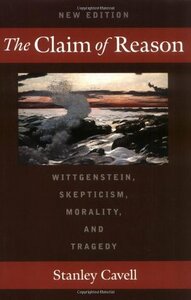Take a photo of a barcode or cover
I'm very enthusiastic about the way Cavell does things (though his writing does feel verbose at times). I don't have the most sophisticated understanding of /The Claim of Reason/ yet but I would characterize him as approaching basic longstanding questions (how do I know I'm not dreaming? how do I know that other people are conscious? how are moral claims justified?) through the work of writers like Wittgenstein and Shakespeare in an unusual and edifying way: rather than as intellectual puzzles such questions are interesting in what they expose about the nature and quality of our relationships to ourselves, others, and the world. He makes philosophical thought personal, turns my attention to MY life and the people close to me. But I shouldn't try to be too general. Each chapter (book?) is interesting, detailed, and pretty self-contained. If you like philosophy and literature and wish that they made better bedfellows, check out Cavell.
Here, as in all his writings, Cavell is like a philosophical DJ, cutting and scratching, spinning back, and bending the pitch of Wittgenstein, Austin, Descartes, Thompson Clarke, Shakespeare, Heidegger, et al. Stephen Mulhall has a great paper called "On Refusing to Begin" in which he wonders what The Claim of Reason is about, what kind of text it is. A tough question, to be sure, but for starters, we know it is, in part, a grand remix of the Philosophical Investigations, the Meditations, Othello, etc.

